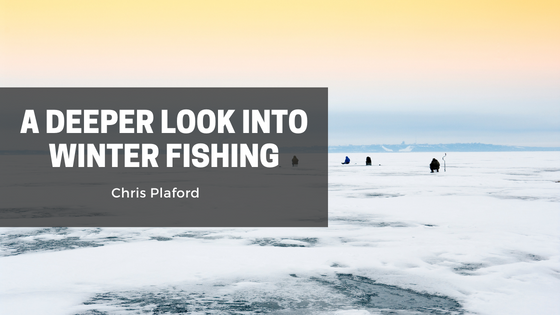Fishing is an activity that can be enjoyed all year long. From spring to fall, fishermen have the opportunity to find a variety of fish species in both saltwater and freshwater. Fishing during the winter is no different. Anglers have the chance to land some of the biggest catches of the year, so the cold weather is no excuse to put away your fishing equipment.
Behavior and Habitat
As winter approaches, fish will seek out warm, oxygen-rich areas in a body of water. As a result of fall turnover, more oxygen is available at the bottom of a lake, which retains some warmth even if the surface freezes. Fall turnover mixes water in the lake, allowing dissolved oxygen from the top to move to the bottom before the lake freezes. The hypolimnion, the bottom layer of water in a lake, is the warmest layer in winter and the coldest in summer. Even though cold water holds oxygen better than warm water, oxygen levels vary beneath the surface. Fish depend on the sun’s rays, subaquatic plants, and the fall turnover to regulate dissolved oxygen levels in a lake to stay balanced during winter.
Benefits of Winter Fishing
Fishing during the winter has some clear benefits compared to fishing during the busier spring and summer seasons. With fewer boaters on the water, finding the perfect spot for fishing is easier. Winter fishing has many advantages, but ultimately, the biggest draw for winter fishing is the chance to catch an extraordinary fish. No matter the weather, a passionate fisherman won’t miss the opportunity to get out on the water. If you’re considering fishing this winter but are apprehensive about your chances of catching something, here are several reasons why you should go fishing when the temperature drops.
Bigger Fish
In winter, there are usually fewer fish available to be caught. However, the size of the fish that can be caught usually increases. Cooler temperatures cause fish to slow down and eat less during a period of inactivity known as torpor. When in a state of torpor, fish regulate their metabolism by significantly reducing their heart rate, breathing, and muscular activity, resulting in sluggish behavior. While it’s true that it can be hard to catch a fish during the winter months, once you get a bite, you’re almost guaranteed a catch, as the fish doesn’t have enough strength to fight back. The potential to catch larger, more valuable fish increases, and it’s more likely you’ll snag a prized specimen.
Less Boat Traffic
During warm weather, fishing spots can become crowded. However, in the winter, more fishing spots are available and are less crowded. With more fishing spots available, you’ll be able to increase your chances of finding a productive fishing hole, allowing anglers to enjoy some of their favorite fishing spots without much competition. A boat disturbing your fishing spot is less likely to be a problem in the winter as fewer boats are on the water, and your encounters are more likely to be with experienced boaters.
Late Mornings
During the winter season, you won’t need to wake up extra early to have a successful day of fishing. With much colder weather and shorter daylight hours, the fish aren’t typically active until later in the morning. They tend to stay deep in the water during the night and morning when temperatures are warmer. As air temperature increases throughout the day and sunlight warm the water, higher temperatures of the upper layers encourage fish to rise and become more active.
When the temperature drops, winter fishing can be a great experience. Even on colder days, the fish are still biting! With the right winter apparel, it’s possible to stay warm and enjoy your time on the water.
